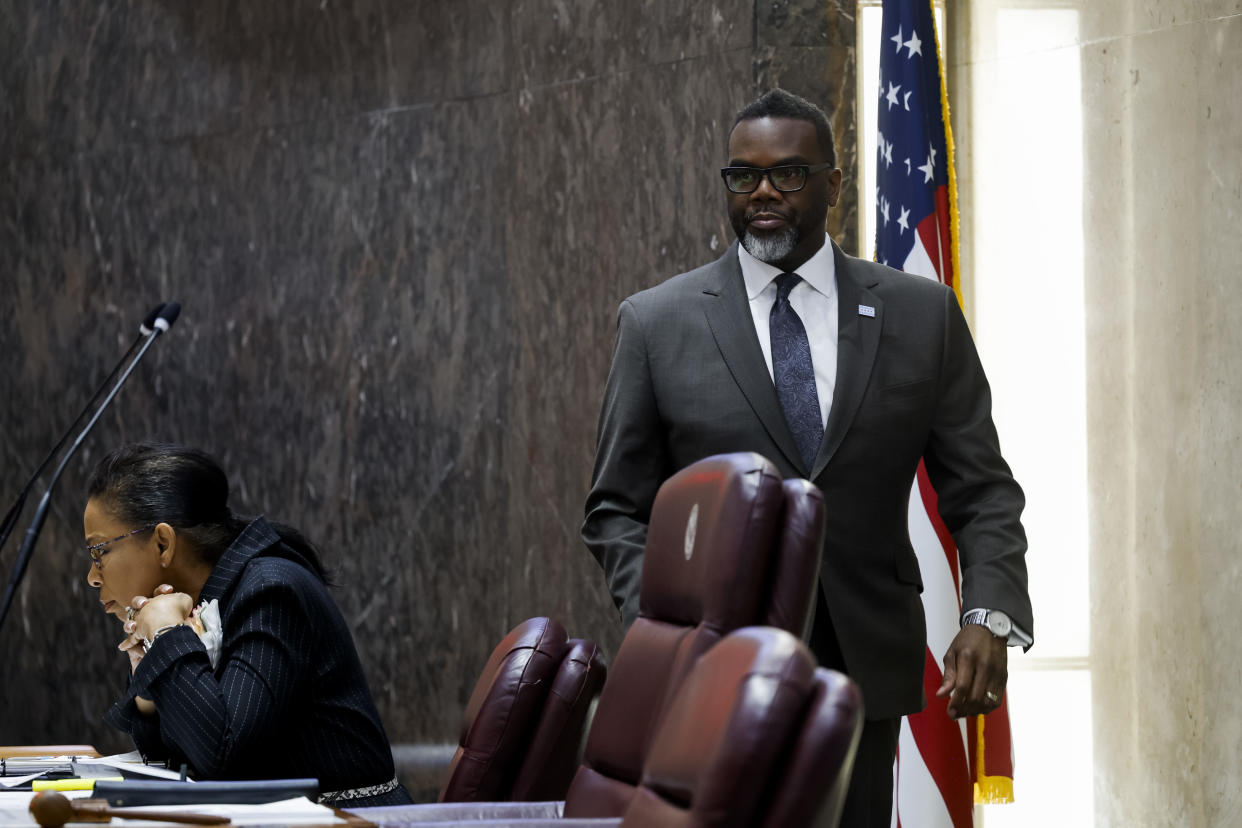Civic groups call on mayor, aldermen to enact City Council ethics reforms

- Oops!Something went wrong.Please try again later.
Three of Chicago’s most important civic organizations are urging the City Council and Mayor Brandon Johnson to make major ethics changes designed to keep the public informed and engaged with what the council is considering.
The leaders of the Better Government Association, the Civic Federation and the League of Women Voters of Chicago called for more transparency and better public access in the body in a letter shared publicly Thursday to Johnson and the council Rules Committee chair, Ald. Michelle Harris, 8th.
The groups criticized current City Hall leaders for circumventing rules designed to publicize what aldermen are considering and chipping away at public access to meetings in a letter signed by BGA President David Greising, Civic Federation President Joe Ferguson and League of Women Voters of Chicago President Jane Ruby.
“Under the current process, it is difficult even for groups informed on government practices, such as ours, to remain abreast of legislation moving through City Council — a strong indication that the process is opaque to the general public,” the letter said.
The letter called for a host of reforms to require the council to share agendas that accurately reflect what aldermen will vote on and debate. State law and city ordinance require the city to share agendas for council meetings 48 hours ahead of time.
However, such rules are often flouted through parliamentary maneuvers and the use of late substitutions and direct introductions that substantially alter what aldermen will consider, the letter said.
“Agenda items are far too often introduced to committees without prior public posting of their text and sometimes without even alderpersons having an opportunity to see the text,” the letter said.
The three groups called for the 48-hour window to be expanded to four business days and for the full text of all agenda items to be published. They also called for new restrictions blocking the use of substantive substitutions and unannounced direct introduction in an effort to limit aldermen’s ability to dramatically change what is debated during meetings.
It remains to be seen whether the groups’ letter spurs any changes. Aldermen have long resisted adjustments to the way they do business, and Johnson has so far shown little appetite to try to force council reform.
In a statement from spokesperson Ronnie Reese, the Johnson administration pushed back against some of the letter’s criticisms.
The city “scrupulously follows” the state’s Open Meeting Act and the council “faithfully adheres” to the 48-hour prior posting requirement, Reese said.
The administration appreciates the feedback and will discuss the proposals “with all stakeholders,” Reese said.
“The Johnson Administration appreciates and encourages public engagement and feedback in the legislative process,” he added. “The robust levels of public engagement at City Council meetings are a positive indication of accessibility, even in situations when the gallery has been so disruptive as to bring meetings to a halt.”
But Greising, in a statement separate from the groups’ letter, said that “based on the way the City Council and committees operate currently, there is hardly any opportunity for meaningful public participation.”
The letter also criticized formerly planned restrictions on access to the City Council chambers that the groups successfully pushed back against. Johnson announced in early December a new policy curtailing public seating in the chambers, but reversed course after outcry that the restrictions could hurt the openness of public meetings.
“The situation demonstrated the need for organizations like ours to protect public participation in the democratic process. It is the right of every citizen to have equal access to their government,” the letter said.
In an effort to provide better public access to government, the groups called on Johnson and the council to offer more time and a simpler process for people registering to speak at meetings. They also called for the council to consider expanding the amount of time allotted for public comment at meetings and called for better systems to record and share what public speakers say.
The “clumsy” December chambers restrictions were a “trip wire” for the civic groups, said Ferguson, the city’s former Inspector General.
Johnson, former Mayor Lori Lightfoot and the City Council are all to blame for the gradual and ongoing “drift toward chaos” that made it necessary for the groups to speak up, Ferguson said. The persistent misuse of procedural rules and failure to release clear meeting agendas have mounted to the point where many aldermen don’t know what’s going on when they walk into a vote, he said.
“What we have right now is a regimen where the predictability of the application of the rules that have long existed can’t be relied upon,” he said. “If we are to have truly open participatory democracy, we need to lower the barriers to access and information.”
The changes the three groups seek are easily implementable and similar to what already occurs in Cook County government, but a big change for a council known to resist reform, Ferguson said.
“It’s just a chipping away at the really, really fragile fabric of democracy,” he said. “This is an opportunity for an easy win for the mayor and the City Council.”

